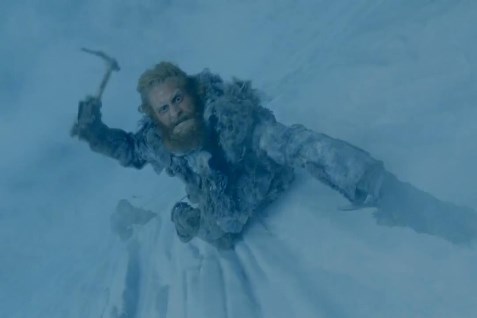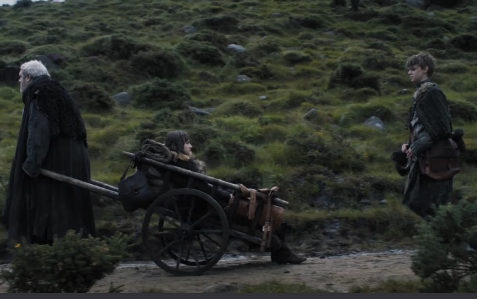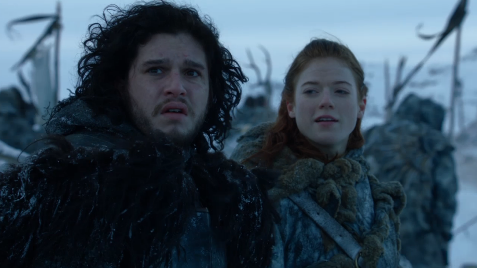Game of Thrones 3.07: The Bear and the Maiden Fair
SPOILER WARNING: Whether you’ve read all five books or only watch the series this post is for you. I have read the books (multiple times) but I will not go beyond the scope of the TV series (save a wink or a nod every now and then that only my fellow readers will catch on to). All events that have occurred in the TV show up to and including yesterday’s episode are fair game. You’ve been warned.
Note: With the biggest cast in television it can be hard to keep all the names and faces straight. Thus the first mention of each character contains a link to a picture of them which will open in a new tab.
I just want to note that George R.R. Martin, author of the books that make up Game of Thrones’ source material, also wrote this week’s episode. Not much to say beyond that, but it’s always worth pointing out that the man most familiar with the characters writes the episode.
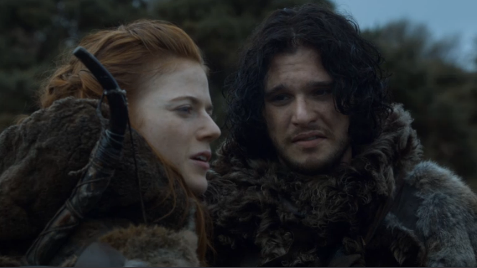
But First We’ll Live
Perhaps the most straightforward theme in this week’s episode was that of love, the way it comes about and the way it ends, loves meant to be and those between the star-crossed. It remains to be seen which of those categories Jon and Ygritte fall into, and “The Bear and the Maiden Fair” spent a good amount of time essentially wondering the question aloud.
The episode opens with Jon and the Wildlings marching towards Castle Black. Ygritte takes pleasure in mocking the customs of Westerosi warfare: marching down roads while holding banners and banging drums to let the enemy know you’re coming. When she sarcastically asserts they won’t be banging any drums when they attack Castle Black, Jon retorts that instead, Mance will “light the biggest fire the North’s ever seen.” Ygritte counters in the same way she always does: “You know nothing, Jon Snow.” That’s when Orell wanders over to put some real bite behind her words. Giving Jon some sage romantic advice while spelling out the episode’s theme: “People work together when it suits them, they’re loyal when it suits them, they love each other when it suits them, and they kill each other when it suits them. She knows it, you don’t, which is why you’ll never hold onto her.”
Of course, later on we discover that Orell may not be as wise as his words indicated, he simply wants in Ygritte’s pants too. Orell steps up to tell her as much, and to warn her that Jon isn’t as loyal to their cause as he appears. But in doing so, he proves to be affording Ygritte way less credit than she deserves. As we learned last week, she’s more in touch with their position than anyone: She knows Jon is still loyal to the Night’s Watch, and it doesn’t factor into her decision to be with him because she’s realistic about the odds of their survival.
The tables of mockery are turned when they come upon a windmill and Ygritte asks Jon if it’s a palace. But as was the case in their earlier discussion of drums and marching, the talk turns serious. Jon mentions that he’d like to take Ygritte to see Winterfell, and she responds that maybe she’ll take him, once they’ve “taken their land back.” The conversation brings to the forefront a fact they’ve both been trying to forget, that they’re on different sides of the war, and their visions of what life will be like afterwards are highly disparate. That’s when Jon tells her that Kings beyond the Wall have tried to reclaim the North six times in the past thousand years, and six times they’ve been turned away. He insists that the seventh will be the same, pushing the point even after Ygritte claims that Mance is different than those that came before him, saying that “all of you will die.” Ygritte reminds him that it’s “all of us,” but like her talk of Mance she’s simply posturing. That’s when she lets us in on her true vision of the future: “You’re mine, and I’m yours. And if we die, we die. But first we’ll live.” Jon agrees.
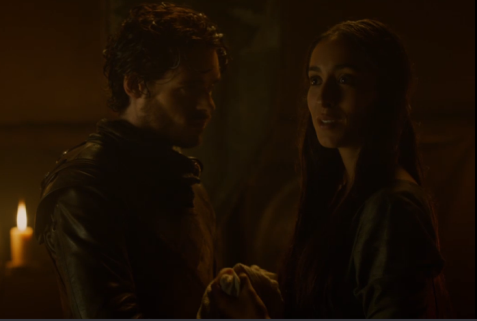
Love is the Death of Duty
In the first season, Maester Aemon told Jon that “love is the death of duty,” and while the idea is clearly written all over Jon’s storyline, his brother Robb’s may be an even better example. Love is the cause of all the King in the North’s problems, and the reason he’s losing the war despite having won every battle.
It’s not only Robb’s love that’s hurting the war effort. Catelyn’s love of her daughters led her to free Jaime Lannister, which in turn led to Lord Karstark’s betrayal and subsequent beheading. That’s why Robb and his army are on their way to the Twins to attend the marriage between his uncle, Edmure Tully, and one of Lord Walder Frey’s daughers. The match was necessitated, of course, by Robb’s double-crossing his own marriage pact with Lord Walder, but also by the fact that he needs the Frey armies more than ever with the Karstark’s gone.
Like most of the episode, Robb’s story wasn’t big on plot advancement. Much like Jon and Ygritte, it served to underline both the true love between the King and Queen in the North and the black cloud hanging over it as a result of the war effort, of duty. As such, the revelation of Talisa’s pregnancy seems a dire symbol. When has any good deed (or good news) gone unpunished in Game of Thrones?
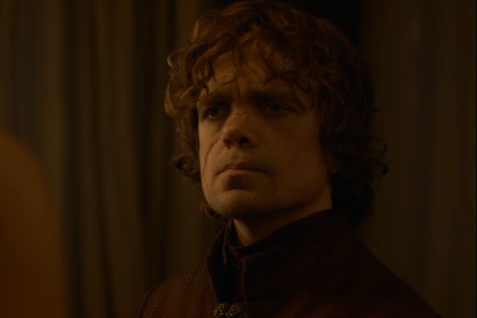
The Impchelor
In our first glimpse into King’s Landing this week, we see Sansa talking to Margaery Tyrell of the woe that is her impending marriage to Tyrion. He’s a Lannister, she complains, and as if that wasn’t enough he’s the scarred, dwarf Lannister. Margaery attempts to cheer her up, pointing out that he’s been kind to her, the scar makes him more attractive, and that he’s experienced in the bedroom, which is a good thing because women are hard to please (her mother told her so). What’s unfortunate is that although Sansa explicitly bemoans the ignorance that led her to dram of the capital and her southern Prince Charming, she’s still not entirely able to recognize that she’s still being ignorant. Tyrion isn’t Loras, that’s for sure, but as Margaery points out he is good looking and he’s been more kind to her than anyone in King’s Landing. What’s more, she complains about all this to the woman betrothed to Joffrey. Come on, Sansa, get your head in the game.
But we know Sansa’s unhappy, nothing’s changed there. What’s more interesting is that Tyrion is just as miserable as she is. He’s had this marriage thrust upon him too, and he’s kind of already in love with Shae. As Margaery does for Sansa, Bronn points out how silly it is for him to be complaining: He’s a lord and she’s a lady, it’s what they’re supposed to do, and it’s not like he has no sexual attraction to Sansa, young as she may be. What’s more, he’s a man, as long as he does his duty in wedding Sansa and getting her pregnant, he can bed Shae on the side for as long as he cares to. Of course, that idea doesn’t go over too well with Shae, who asks him what it will be like. Tyrion responds that he’ll buy her a good home, with guards and clothes and servants, and that any hypothetical children will be well provided for. Shae rightfully snaps back that she has no interest in having children who will never see their father and would likely be killed if their grandfather found out about them. Like so many characters, love is getting in the way of Tyrion doing his duty, and as always, “it will all turn out alright” is never a good bet on this show.
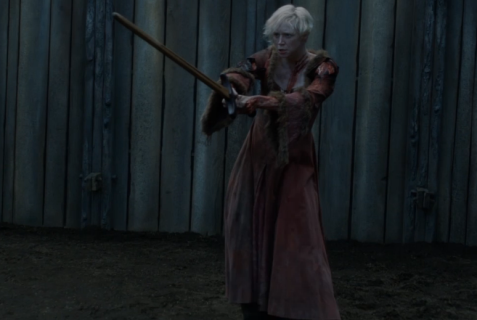
The Bear and the Maiden Fair
Then there’s Jaime and Brienne, a match no one and everyone saw coming. It’s hard to say whether their feelings for one another go beyond the platonic, but they certainly care deeply for, and perhaps even love each other, in their own way. Losing a hand has changed Jaime, sure, but no more than Brienne has. Would pre-Brienne Jaime have even bothered to go to her chambers and insist that even though there is nothing commanding him to return the Stark girls to their mother, save honor, he will. Brienne has reminded him that honor is enough, and Jaime’s travels with her have revealed to us that despite all he’s done and the opinion we may have held of him before, that’s something he knew well enough at one point. In his talk with Qyburn, Jaime condemns the immorality of killing people for research. But when Qyburn snaps back by asking how many lives Jaime has taken (“countless”) and how many he’s saved, he gets an unexpected answer: half a million, the population of King’s Landing. In much the way some people rediscover religion, Jaime is a reborn honorable man, and that’s what leads him to command that he and the part of Bolton men return to Harrenhal, where he leaps into a bear pit to save his maiden fair.
Check out the preview for next week’s episode below and follow the writer on Twitter @NateKreichman.
You can follow us on Twitter and Facebook for content updates. Also, sign up for our email list for weekly updates and check us out on Google+ as well.
Posted in: Television
Tags: Blackfish, Brienne of Tarth, Brynden Tully, Catelyn Stark, Edmure Tully, Game of Thrones, Game of Thrones blog, Jaime Lannister, Jon Snow, Mance Rayder, Margaery Tyrell, Nate Kreichman, Orell, Robb Stark, Sansa Stark, Shae, Talisa, Tormund Giantsbane, Tyrion Lannister, Tywin Lannister, Ygritte

